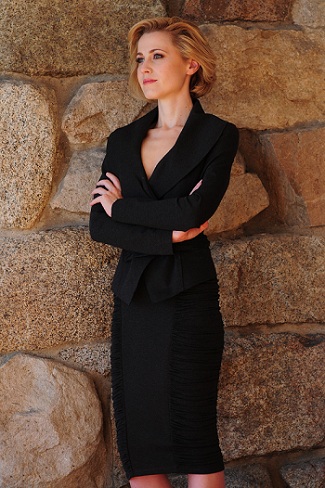
Name Dr. Erika Ebbel Angle
- Education B.S. Chemistry (MIT), Minor in Music (MIT), Ph.D. in Biochemistry (BU School of Medicine)
- Target Audience Middle School

Science fairs or beauty pageants... who says you can't do both? Dr. Erika Ebbel Angle, biochemist and former Ms. Massachusetts, didn't feel like she had to make a choice between pursuing a career in science and the pageant circuit. Read on to find out how Dr. Ebbel Angle finds balance between biochemistry and her feminine side.
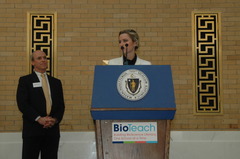
I am also working on a start-up biotechnology company, Counterpoint Health Solutions, Inc. The goal of this company is to look for small molecule biomarkers, which can be used for early prediction of disease, as well as for treatments for disease. Ultimately, we would like to apply these treatments to neurodegenerative diseases such as Huntington Disease and ALS.
This is a long story...
When I was 11, I was offered the choice choice of going to Washington D.C. for a class field trip or to Cancun for April vacation. My parents couldn't afford to pay for both. I chose the Cancun vacation. Those of us who did not go on the class trip had to stay back home at school with our English teacher, who gave us books like Jurassic Park and Andromeda Strain to read. To accompany our reading we also did simple experiments such as growing bacteria in petri dishes. I really loved all of it. During my April vacation in Cancun we visited a crocodile farm. I learned that when crocodiles are mortally wounded they can flip over onto their backs, slip into a coma and die. For some reason that really affected me and I remembered this fact about the crocodiles' mortality when it was time to do a science fair project when I returned from April vacation. I wondered if cells commit suicide when they are infected by viruses similar to what happens with crocodiles in order to avoid a horrible death. From there my science fair hypothesis was born.
I knew I would have to find somebody to help me test my hypothesis, so I pulled out the yellow pages and looked up local biotechnology companies. I called these companies on the telephone and told them that I was an eleven year old student looking for a mentor to assist with a science fair project idea. Most of the companies never called back. I finally found one individual named Michael who was the director of a local public health laboratory. Michael agreed to meet with me. He asked what I knew about subjects like microbiology and immunology. Being eleven years old I knew very little (to none) so he sent me home with a bunch of text books. I was intimidated, but it didn't scare me away. He informed me that he was available after 4 pm to answer questions and thus, I kept going back to learn more from him. Finally, I told him of my idea for an experiment to see if cells commit suicide. He provided suggestions for how to do the experiment, leaving me to design the method on my own.
I infected some cells with the least dangerous virus they had stocked in the lab, which was Herpes type 1 (the virus that causes cold sores on the lip). I waited for numerous hours watching to see if the cells committed suicide. Since I had never conducted this type of experiment before, I did not know what to expect. I learned that there was no simple way to tell the difference between whether the cells were dying because they were being infected by viruses or because they were committing suicide.
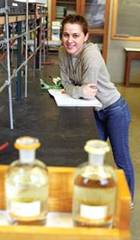 Our school-wide science fair came and I didn't win, but that was my first experience in a lab and I loved it.
Our school-wide science fair came and I didn't win, but that was my first experience in a lab and I loved it.
The following year I was sick in bed with the flu and my dad gave me a book about Russian folk medicine to peruse through. This book described numerous herbal therapies for treating the flu. I was intrigued by these therapies, and decided that for my next science fair project I would test an herbal remedy on the same herpes virus that I worked with the year before. I called Michael and proposed my idea. He advised me to do research at the medical library. There I found a journal article which listed ten herbs that were most effective in treating the herpes virus based on experiments conducted by a scientist in China. Unfortunately, the complete article was in Chinese (and I was unable to read it), however the abstract was available in English. Although the method was not described, the names of the most effective herbs were included. I then went to a local Chinese herb store and purchased four of the herbs mentioned in the article. I prepared the herbs and took them to the lab for testing. Michael encouraged me to design experiments to test the plant material. Two of the herbs worked in preventing the herpes virus from infecting cells with my initial experimental method. I then decided to focus on one of the two herbs for future experiments because it had been researched in much less depth.
These experiments triggered numerous others and I spent the next six years trying to determine what compound in the plant was responsible for the antiviral properties of these herbs.
Built into being a scientist is the challenge of having experiments fail and wanting to throw in the towel (there is a reason for the "RE" in research). Starting at age 11, I could have quit because the work took a great deal of time and was often frustrating. I was fortunate in that I had the support I needed and was independently motivated.
I also experienced some anti-female stereotyping. As a female it is difficult to fulfill all the pressures that are put on you by media and society. If you're too smart it's bad, if you're not smart enough it's bad, if you're not feminine enough it is bad, if you're too feminine it's bad. I had professors who asked me why I wanted to get a Ph. D., because they thought I was just going to "go and get married anyways." I would ask those professors if they were married and when they said yes I would point out that they were still scientists. Why was the standard different for me?
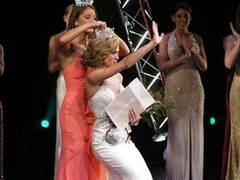 Not long after graduating from MIT I became Ms. Massachusetts in the Miss America program, which was an additional unique experience. Many people thought it was unthinkable that an MIT scientist would ever want to become Ms. Massachusetts. Neither side, MIT nor the pageant organizers, could see the value of the other.
Not long after graduating from MIT I became Ms. Massachusetts in the Miss America program, which was an additional unique experience. Many people thought it was unthinkable that an MIT scientist would ever want to become Ms. Massachusetts. Neither side, MIT nor the pageant organizers, could see the value of the other.
There is great value in participating in pageants because I learned how to become a better public speaker, how to handle myself in stressful situations, how to dress, how to walk, etc. - none of these life skills were taught at MIT. Additionally, I had to apply the skills that I gained at MIT to win the pageant. I had to practice and look at myself with a critical eye to know how to improve in order to win.
There are so many moments where students (girls especially) can fall off the path because someone tells them they can't be a scientist because it is hard, boring or because girls just don't do "that sort of thing." If youngsters hear statements like that from someone they respect or admire, a parent, friend, boyfriend/girlfriend, teacher, etc. it can have an adverse effect. I have learned to take feedback, but ultimately decide myself who I want to be or what I want to become.
There are many kinds of people out there with different motivation. Some people are motivated by other people telling them they can't do something. The most effective motivator for me was my own drive to succeed. My desire was far more important than proving a point to someone else. I learned that accomplishing hard things would be difficult, but this was exciting to me and led to satisfaction if I was able to achieve the "hard thing." I wish that I was a super genius and that everything could come to me naturally, but that has never been the case. The reality is that I had to study very hard.
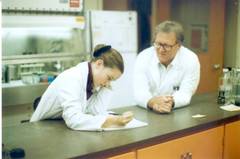 I am fortunate that I have very supportive parents. Also, I had very influential mentors including Michael. I had professors who helped me on the more complex areas of my research and even found a mentor at a biotech company. These were people that spent time with me after work and on weekends. For example, my parents would drop me off at 9 AM on a Saturday and my mentor would spend the entire day teaching me.
I am fortunate that I have very supportive parents. Also, I had very influential mentors including Michael. I had professors who helped me on the more complex areas of my research and even found a mentor at a biotech company. These were people that spent time with me after work and on weekends. For example, my parents would drop me off at 9 AM on a Saturday and my mentor would spend the entire day teaching me.
When I started Science from Scientists, the goal was to introduce scientists to the classroom who could serve as mentors to the students. Mentors can be incredibly important and influential individuals who teach you and guide you. Also, mentors let you figure things out for yourself. When I was younger, Michael from the lab would let me do things even if he knew that I was going to fail or that the experiment wouldn't work. He never told me that my experiment wasn't going to work. Instead, he let me find that out for myself because he knew that the process was just as important as the end result. I learned that failure was a normal part of the research process. Additionally, through trial and error I learned the value of perseverance.
As stated before, find a summer science program or work on a science project outside of school. Many universities offer these summer programs. Possibly, find an internship program at a local company. High school AP classes in science are useful to take simply because they encourage more learning.
Biochemistry is a very broad field and it depends on what you're interested in doing. Moving forward I think Biochemistry is going to become "specialized" depending on the particular focus. There are medical applications of biochemistry, dietary applications. Innovations might include: ways in which medicine is tweaked for the individual based on an individual's unique biochemistry; the combination of technology and medicine to predict and treat disease, etc. We are heading in a direction where the quality of the technology will allow us greater ability to predict and treat illness.
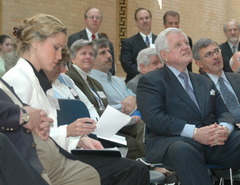 I study science because there is so much still unknown about the planet and the universe. It is always exciting for me to think that what I discover with regard to disease might actually be able to help cure the disease in the future. One thing that isn't made clear to students in science is that whether it's the fabric you're wearing or the phone you're talking on, without science none of these things would exist. Having an inquisitive mind makes you a natural scientist. There is so much yet undiscovered and we need children to go into these fields so that we can all live better lives in the future.
I study science because there is so much still unknown about the planet and the universe. It is always exciting for me to think that what I discover with regard to disease might actually be able to help cure the disease in the future. One thing that isn't made clear to students in science is that whether it's the fabric you're wearing or the phone you're talking on, without science none of these things would exist. Having an inquisitive mind makes you a natural scientist. There is so much yet undiscovered and we need children to go into these fields so that we can all live better lives in the future.
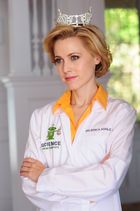 In addition to being the CEO of Science from Scientists and building a start-up biotech company, Dr. Ebbel Angle also has her own show! The Dr. Erika Show allows her to explore science with a live studio audience! Learn more about her show here!
In addition to being the CEO of Science from Scientists and building a start-up biotech company, Dr. Ebbel Angle also has her own show! The Dr. Erika Show allows her to explore science with a live studio audience! Learn more about her show here!
Abdul Yassine is a senior biology major and soccer player at Southern M…
Melissa Wallace is an SMU alumna who studied Mechanical Engineering. Sh…
Do you love music and science? Do you think you have to choose just one…